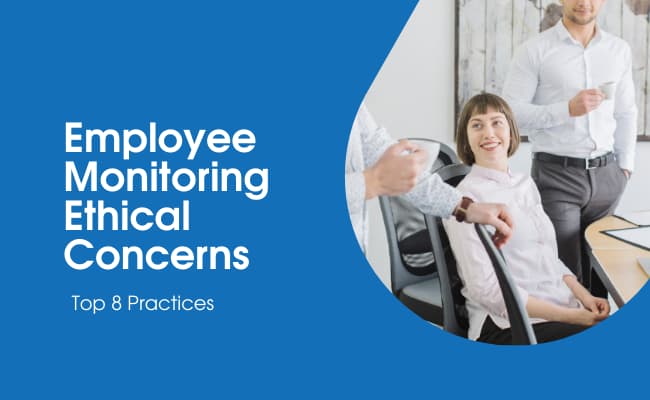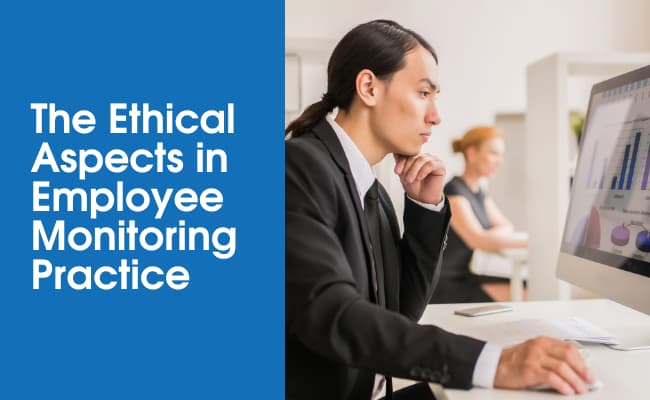Top 8 Practices Addressing Employee Monitoring Ethical Concerns
2024-09-10

Is it achievable to apply employee monitoring programs not violating the employees’ rights for personal data security? Do employees really think about ethical concerns setting up employee monitoring software? What causes a growing-up tendency to install this tool? So many questions rise when speaking about this topic. Let’s start from the very beginning to pick up as many facts about ethical concerns and how to address them.
Why There Is a Growing Tendency of Employee Monitoring Software?
The growing tendency is confirmed by the market increase directly. The Fortune Business Insights-held survey shows the following figures:
- 2023: the market size value is equal to USD 535.1 million
- 2024: the forecasted increase is USD 587.8 million
- 2032: the greatest jump is equal to USD 1,465.2 million
The statistics back up that the market of employee monitoring software is constantly going up and will not be soon on a decline. The reasons for such growth are diversified from mode of work to risk mitigation. We choose the fundamental reasons why the employee monitoring market rise persists:
- Hybrid and remote work result in security and productivity issues: COVID-19 adjusts the work mode in a way into remote and hybrid. Many even huge companies offer their staff to choose between remote and hybrid modes of work. As a result, the question of monitoring employee productivity rises. The market proposes many innovative tools such as employee monitoring software. The employers are capable of monitoring productivity of every remote worker.
- Prevent data leaks: The monitoring software allows every businessman to safeguard the sensitive company data. Nobody can carry out unauthorized access to violate the security patterns of the company.
- Improve business processes: What else the businessman needs to get even more profit? Specialists recommend adopting employee monitoring software to improve business processes. It will contribute to the increase in productivity rate, the proper distribution of duties among the staff members. Engaging, isn’t it?
- Find unproductive employees: Such tracking of employees’ activities leads to the understanding of the unproductive employees’ level in your company, department, etc. It is one of the best solutions to eliminate this weak side.
- Compliance and risk mitigation: Compliance and risk mitigation are central pillars in the deployment of employee monitoring software. Organizations adopt such tools not only to enhance productivity and security but also to ensure adherence to legal standards, and mitigate potential risks associated with their non-compliance.
Is Employee Monitoring Legal?
Employee monitoring is generally legal in the United States as well as in many other countries, but it must respect and fulfill both federal and state regulations. They often stress employee privacy alongside the employer's rights to monitor their activities.
The federal laws such as the Electronic Communications Privacy Act (ECPA) and the Stored Communications Act regulate the extent to which electronic monitoring can take place. Under these acts, employers are permitted to monitor employee activities if there's a legitimate business reason. Moreover, they generally require consent when employees use company-owned devices.
While federal laws ensure a wide legal framework, several states have passed their own laws. In accordance with these laws, employers are required to notify employees about monitoring practices. The states that mandate prior notification include Connecticut, Delaware, New York, and Texas. These states require explicit communication about monitoring activities and, in some cases, consent from employees before such monitoring can begin.
How To Ethically Monitor Employees - Best Practices
Spyrix team takes the effort to emphasize the top practices to ethically monitor employee productivity. The paragraphs below include 8 best ethical monitoring practices.

#1. Create a Detailed Policy
The policy concerning employee monitoring marks off the rules and guides for workplace tracking within your company. This policy should depict the procedures and instruments you are currently using for tracking employees, considering employees’ morale. Your policy should spell out the following questions:
- Who is monitored?
- What target devices are monitored?
- What activities are monitored?
- Who has access to conduct monitoring?
- In what way will an employer notify an employee about tracking?
- What is the aim of monitoring?
- How do you ensure the privacy of target employees?
- How is the data protected and stored, and for how long?
This policy serves as the base for enacting proper employee monitoring ethics, guaranteeing a structured approach, and enhancing compliance with legal requirements.
#2: Be Fully Transparent
To find work-life balance, the employer should be as transparent as possible. Along with the questions stated in the policy, employees should need the answers to them. Who is monitored, with what purpose, for how long, who estimates the received data? According to the statistics, 92% of workers are open to the collection of data on them and their activities, but only if it enhances their performance or well-being or provides other benefits. It is a common practice when an employer sets up monitoring software not to retire an employee, but to boost his productivity.
#3: Limit The Scope Of Monitoring
It is crucial to limit the scope of employee monitoring to maintaining trust and ensuring legal compliance within a company. Employers should carefully define what is monitored and why, ensuring that monitoring activities are strictly related to legitimate business needs and do not unnecessarily infringe on employee privacy. Monitoring should be restricted to work-related activities only. For example, tracking activities on company-owned devices and networks can be justified. But extending this monitoring to personal devices or non-work-related activities without clear reasons should be avoided.
#4: Prohibit The Targeting Of Employee Groups
It is better to prohibit the targeting of employee groups. It means every computer and an employee, respectively, should be monitored individually. This can be achieved by setting clear guidelines that detail the purposes and procedures of monitoring, which are communicated openly across the organization. Organizations might consider analyzing aggregated data to evaluate overall trends and performance without singling out individual employees or groups, thus maintaining privacy and fairness. By integrating these strategies, companies can foster a culture of trust and inclusivity.
#5: Prevent Discriminatory Practices
The prevention of discriminatory practices allows businessmen to create a health work-life balance. The recorded data is not for humiliating employees, but for coping with burnout, productivity loss, and possible complicated situations. Regular training sessions should be carried out for all employees, including management, to educate them about the significance of diversity and the impact of discrimination. Besides, adopting clear hiring practices that are oriented on diversity can help prevent discrimination from the very beginning. This includes using standardized criteria for evaluating candidates to skip biases, advancing job openings in diverse forums, and employing diverse interview panels.
#6: Be Mindful Of The Data You’re Collecting And When
When collecting data, it's crucial to define clearly what information is necessary for your specific objectives. This method helps avoid the accumulation of unnecessary data, which can disarrange systems and complicate privacy management. Employing data minimization techniques ensures that only the essential information for a particular purpose is gathered, significantly reducing potential risks to privacy.
#7: Educate Employees About Monitoring Policies
Educating employees about monitoring policies is an essential step in fostering a transparent and trusting workplace environment. Effective discussions about these policies helps ensure that employees understand not only what tracking is taking place but also why it is necessary and how it benefits both the organization and its members.
To achieve this, organizations should conduct constant training seminars that highlight the scope and purpose of monitoring practices. These sessions should explain the legal basis for monitoring, the types of data being recorded, and the security measures in place to protect this data. It’s also important to clarify how monitoring aligns with broader company values and objectives, such as protecting company assets, ensuring a safe work environment, and enhancing productivity.
#8: Deploy A Dedicated Software Solution
Adopting a dedicated software solution involves selecting and implementing specialized software tailored to meet specific business needs. This process typically includes identifying key requirements, evaluating different software options, and choosing one that aligns with your organization's operational goals and budget constraints. Once selected, the software is installed and configured, and staff are trained on how to use it effectively. Regular updates and maintenance are crucial to ensure the software continues to function optimally and remains secure.
FAQs
What Are The Benefits of Employee Monitoring Software?
- Enhanced productivity: Monitoring software helps define inefficiencies at the workplace, allowing managers to optimize processes and boost productivity.
- Improved security: It can discover potential security loops and unauthorized data access, guaranteeing the total security of sensitive company information.
- Regulatory compliance: Helps ensure that business operations meet legal requirements and industry regulations, decreasing the risk of costly legal issues.
- Better time management: Ensures insights into how employees spend their work time, which can contribute to more effective time management strategies.
- Remote management: Facilitates the management of remote teams by tracking progress and maintaining operational consistency across various locations.
What Monitoring Software Features Are Offered On The Market?
- Time tracking: Records how much time employees spend on specific tasks and projects.
- Screen monitoring: Captures screenshots or videos of employee screens at specified intervals.
- Keystroke logging: Records keystrokes to monitor activity levels and content typed.
- Email monitoring: Tracks incoming and outgoing emails to ensure compliance and productivity.
- Internet and app usage: Monitors which websites and applications are used, and for how long.
- Location tracking: Uses GPS to track the location of remote or field employees.
- Productivity metrics: Analyzes data to provide insights into employee productivity levels.
- Real-time alerts: Sends notifications based on specific activities or anomalies detected.
- Face recognition: Helps identify the employee in the workplace, especially for remote and hybrid workers.
What Are Ethics In Monitoring And Evaluation?
Key ethical considerations include:
- Confidentiality: Protecting the privacy of individuals and the security of their data.
- Transparency: Being open about the goals, processes, and findings of the evaluation.
- Integrity: Ensuring honesty and accuracy in gathering and reporting data.
- Respect for Persons: Treating all participants with dignity and respecting their rights.
- Responsibility: Making decisions that promote the welfare of participants and stakeholders.
